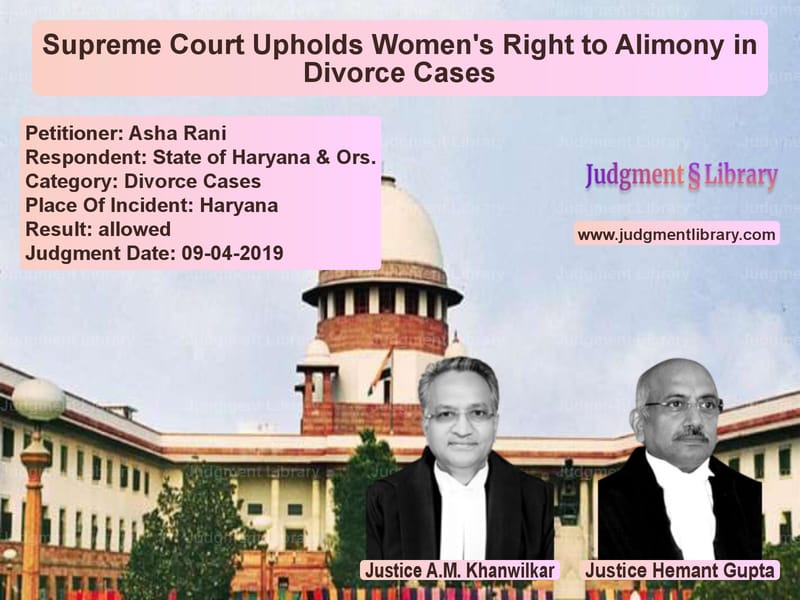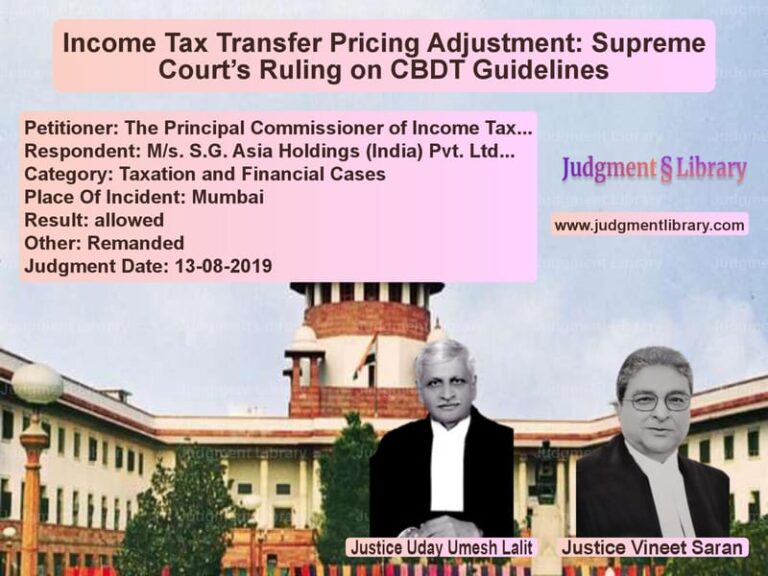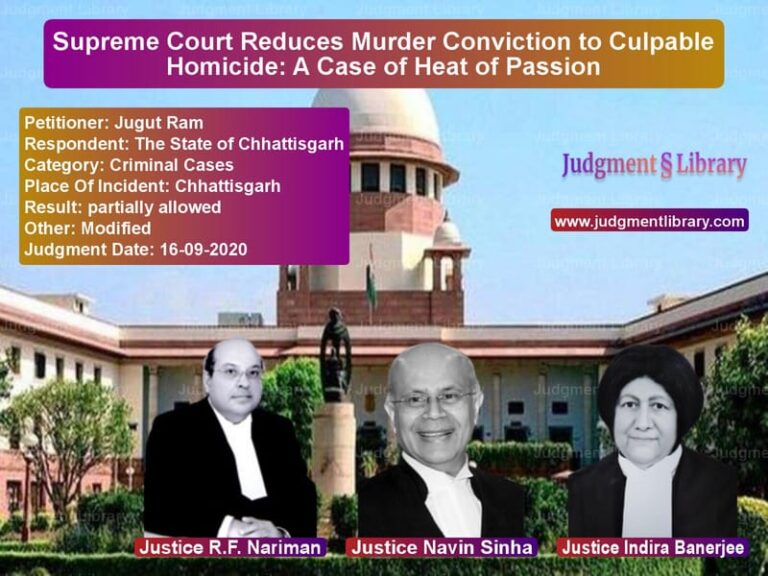Supreme Court Upholds Women’s Right to Alimony in Divorce Cases
The Supreme Court of India, in the case of Asha Rani v. State of Haryana & Ors., upheld the woman’s right to receive alimony following a divorce under the provisions of the Hindu Marriage Act, 1955. The Court ruled that the husband’s refusal to provide maintenance after the divorce was a violation of the provisions meant to protect women’s financial rights in marriage dissolution.
Background of the Case
The case concerned a petition filed by Asha Rani, who sought maintenance under Section 25 of the Hindu Marriage Act after her divorce. The petitioner claimed that her husband, Ramesh Kumar, had been denying her alimony despite a court order. Asha Rani argued that she had been subjected to domestic abuse and was financially dependent on her husband. However, the trial court dismissed her application for alimony, stating that she had failed to demonstrate her financial incapacity.
Upon appeal, the case reached the Supreme Court, where the issue of the wife’s right to alimony and the conditions under which maintenance should be granted was debated in depth.
Petitioner’s Arguments
- The appellant, Asha Rani, contended that under Section 25 of the Hindu Marriage Act, she was entitled to a reasonable amount of maintenance after the dissolution of the marriage.
- She stated that she was unable to sustain herself due to her limited income and the lack of support from her ex-husband, Ramesh Kumar.
- Asha Rani argued that she had been subjected to domestic violence, and her financial dependence was exacerbated by the abuse, leaving her with no resources for self-sufficiency.
Respondent’s Arguments
- The respondent, Ramesh Kumar, argued that Asha Rani had not provided sufficient evidence to justify her need for alimony.
- He contended that the trial court had correctly dismissed the case, asserting that there was no financial necessity for Asha Rani to claim maintenance.
- Ramesh Kumar also questioned the authenticity of the allegations of abuse, claiming that the petitioner had fabricated her claims to extract money from him.
Supreme Court’s Observations
The Supreme Court, in a judgment authored by Justices A.M. Khanwilkar and Hemant Gupta, made key observations about the right of women to maintenance after divorce:
1. Interpretation of Section 25 of the Hindu Marriage Act
The Court interpreted Section 25 of the Hindu Marriage Act, which allows the wife to claim maintenance after divorce, including the right to receive alimony if the wife is unable to maintain herself.
“Section 25 provides that a wife, if unable to maintain herself, is entitled to receive such maintenance from her husband as the court deems just, having regard to the husband’s income and the wife’s needs.”
2. Financial Dependency of Women Post-Divorce
The Court acknowledged that many women become financially dependent on their husbands during marriage and that post-divorce, they may not have the means to sustain themselves. In such cases, alimony is essential.
“A woman’s right to alimony is not dependent on her employment status or ability to earn, but on the husband’s duty to provide financial support after divorce.”
3. Inability to Maintain: Proof and Discretion of the Court
The Court elaborated that while the wife needs to prove her inability to maintain herself, it is ultimately up to the court’s discretion to determine the amount of alimony, considering both parties’ financial standing.
“The inability to maintain oneself must be understood in the context of the wife’s overall financial condition, social standing, and the husband’s ability to pay.”
4. Role of Domestic Violence in Alimony Claims
The Court noted that domestic violence, which affects the wife’s mental and physical well-being, can exacerbate her financial dependency, further justifying the need for maintenance.
“The effects of domestic violence contribute significantly to a woman’s inability to maintain herself, and this should be considered while granting alimony.”
Final Judgment
The Supreme Court ruled that Asha Rani was entitled to alimony under Section 25 of the Hindu Marriage Act. The Court emphasized:
- The husband’s duty to maintain his wife after divorce, especially when she is unable to maintain herself.
- The trial court’s dismissal of the claim for alimony was incorrect, and Asha Rani was entitled to a fair and just amount of maintenance.
- The exact amount of maintenance should be determined based on the financial condition of both parties and the circumstances of the case.
“The appeal is allowed, and the wife shall be granted alimony as per the discretion of the Family Court, taking into account the husband’s capacity to pay and the wife’s need for sustenance.”
Key Takeaways
- Alimony as a Fundamental Right: The ruling reinforces that alimony is a woman’s right and not merely a privilege, especially when she is unable to maintain herself after divorce.
- Consideration of Domestic Violence: Domestic violence plays a significant role in determining the financial dependency of women post-divorce.
- Judicial Discretion in Alimony: Courts have the discretion to award a reasonable amount of alimony, considering the financial standing of both parties and the circumstances surrounding the divorce.
- Protecting Women’s Rights Post-Divorce: The decision strengthens legal protection for women, ensuring they are not left destitute after divorce, especially when they have been subjected to abuse.
Conclusion
The Supreme Court’s ruling in Asha Rani v. State of Haryana & Ors. sets a significant precedent for women’s rights post-divorce, ensuring they are entitled to maintenance if they are unable to sustain themselves. The Court’s interpretation of Section 25 of the Hindu Marriage Act upholds the importance of financial independence for women, while also recognizing the need for protective measures in cases involving domestic violence.
Petitioner Name: Asha Rani.Respondent Name: State of Haryana & Ors..Judgment By: Justice A.M. Khanwilkar, Justice Hemant Gupta.Place Of Incident: Haryana.Judgment Date: 09-04-2019.
Don’t miss out on the full details! Download the complete judgment in PDF format below and gain valuable insights instantly!
Download Judgment: Asha Rani vs State of Haryana & O Supreme Court of India Judgment Dated 09-04-2019.pdf
Direct Downlaod Judgment: Direct downlaod this Judgment
See all petitions in Alimony and Maintenance
See all petitions in Divorce by Desertion
See all petitions in Judgment by A M Khanwilkar
See all petitions in Judgment by Hemant Gupta
See all petitions in allowed
See all petitions in supreme court of India judgments April 2019
See all petitions in 2019 judgments
See all posts in Divorce Cases Category
See all allowed petitions in Divorce Cases Category
See all Dismissed petitions in Divorce Cases Category
See all partially allowed petitions in Divorce Cases Category







